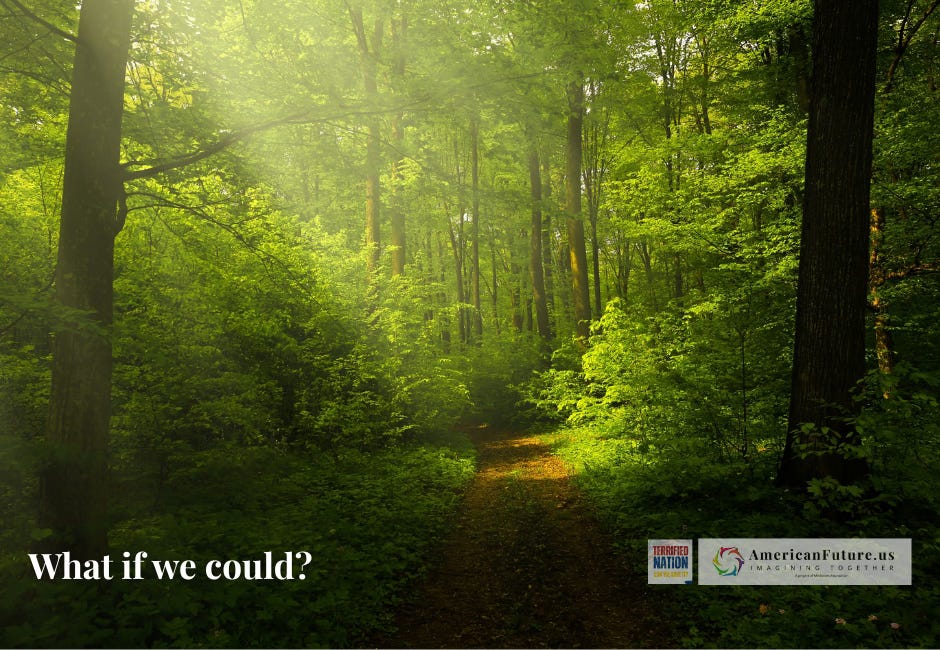What If We Could Build a Society Without Harm?
Reimagining power, care, and collaboration beyond the domination paradigm.
We’re taught to accept harm as inevitable — part of work, life, politics. But what if we questioned that? What if we built a trauma-informed society where care and collaboration weren’t “soft skills,” but core strengths? In this reflection, Debilyn Molineaux invites us to imagine — and build — something new.
I’ve always been the kind of person who questions everything — myself, my friends and family, the world order. I’m always searching for a “better way.”
Maybe you do that, too.
Probably not.
I’m a weirdo — but in a good way, I like to think.
Over the years, I’ve found myself drawn to people with big hearts and bold ideas — people who dream of a better world and are doing their best to build it. We often share a vision: a society that is more just, more whole, more alive. For more than twenty years, I’ve tried to put words around this vision — “drafting a new social contract,” “committing to democratic practice,” “true liberation.”
Each phrase points toward something true, but none are quite enough.
Words fall short when you’re trying to describe a world that hasn’t yet been created.
The vision may be shared, but the “how we get there” is often where things get tangled. Despite our aligned hopes, we bump into differences in style, energy, values, or priorities. And when we do, I bring my whole self — my systems thinking, my relational wisdom, my ability to connect dots and people — into the mix. Sometimes that’s welcomed.
Sometimes, it’s misunderstood or minimized.
There are moments when I feel my contributions are unseen — not because of bad intent, but because the tools I use (relationship, care, empathy) don’t always register as valuable in a world that prizes speed, money, and force.
I’ve learned to recognize a familiar pattern: the tug of dominance. That human desire to feel both safe and liberated — an energy that leads us to controlling others or avoiding being controlled.
It’s an ancient instinct. It ensured our survival.
And now, I believe, it’s killing everything we hold dear.
As psychologist Carol Gilligan wrote, “At times we are all caught in a web of relationships that can either nourish or destroy us.”
And right now, it feels like too many of our webs are choking the very life out of us.
Here’s what’s being lost:
Caring for others in a way that truly meets physical and emotional needs.
Nurturing spaces of safety and trust.
Appreciation of each person’s unique voice and gifts.
Compassion for the messy, beautiful process of being human.
One question has lived in me for years:
What would a trauma-informed society look and feel like?
We are taught that harm is just part of life. But what if it didn’t have to be?
What if we built systems that actively minimized harm, instead of accepting it as the cost of doing business?
Picture it:
A town square designed not for traffic flow, but for connection.
Workplaces where people feel seen and supported.
Justice systems rooted in repair instead of retribution.
Classrooms where young people learn to speak their truths — and listen, too.
That’s the world I can almost taste.
But we’re not there. Not yet.
And part of what’s in the way is the developmental tug-of-war we carry within us — the push for independence at the cost of interdependence.
The toddler’s “NO!”
The teen’s “You’re not the boss of me!”
These are healthy stages — until we build entire systems from them and forget to grow up.
Piaget and Kohlberg mapped the stages of development around rules and justice. But Carol Gilligan noticed something they didn’t:
“While boys tended to frame morality as a matter of rights and rules, many girls and women framed it as a matter of relationships and responsibilities.”
This ethic of care — the thing I and many others lead with — has too often been dismissed as weak or secondary.
And that’s the real crisis.
This is my existential edge.
How do we shift?
How do we help people see, feel, and trust other ways of being — ones not rooted in dominance?
How do we build “power with” instead of “power over”?
Because our lives — and the world we’re handing to future generations — depend on it.
And maybe, just maybe, the first step is daring to believe that another way is possible. That it’s already alive — quietly — in our everyday choices, waiting to be noticed, nurtured, and named.




